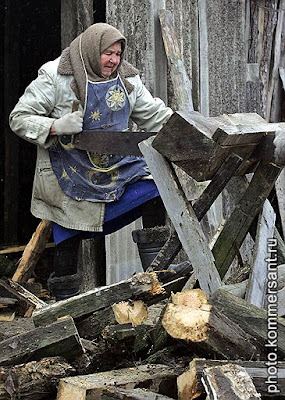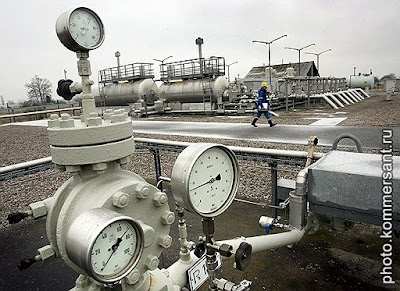
An evident win of the Orange coalition at the parliamentary election in Ukraine has strained the country’s relations with Russia on the gas supply issue. Gazprom on Tuesday came up with blistering statements pushing Ukraine to quickly clear its outstanding debt for gas. The Russian gas monopolist now threatens to cut down the supply and has already warned its European partners about possible problems.
Gazprom, which distanced itself from Ukrainian gas supply discussions before the Supreme Rada election, was quick to react to the very first results of the poll. The Orange victory is clearly unacceptable for Russian authorities and Gazprom alike as Yulia Timoshenko has repeatedly declared plans to review current gas contracts. In the circumstances, the Russian gas monopolist pointed to Ukraine’s $1.3 billion outstanding debt. Gazprom issued an official statement on Tuesday saying that it “informed its European partners of existing problems with gas supply to Ukraine”. The gas giant warned that it would have to cut down the supply for Ukrainian customers in case “the debt is not settled in October”.
 RosUkrEnergo, Ukraine’s exclusive gas supplier, told Kommersant that the debt started to grow in June and “the talks have not settled the matter yet”. A spokesperson for Naftogaz Ukrainy said in an interview with Kommersant that the company “does not know where this debt comes from and where Gazprom took the figure from” but promised to clarify the matter on Wednesday. Ukrgaz-Energo, the Ukrainian gas operator which is owned on a parity basis by Rosukrenergo and Naftogaz, admits that there is the debt and assures that they try hard to settle the matter negotiating outside loans as well.
RosUkrEnergo, Ukraine’s exclusive gas supplier, told Kommersant that the debt started to grow in June and “the talks have not settled the matter yet”. A spokesperson for Naftogaz Ukrainy said in an interview with Kommersant that the company “does not know where this debt comes from and where Gazprom took the figure from” but promised to clarify the matter on Wednesday. Ukrgaz-Energo, the Ukrainian gas operator which is owned on a parity basis by Rosukrenergo and Naftogaz, admits that there is the debt and assures that they try hard to settle the matter negotiating outside loans as well.
Ukraine’s Fuel and Energy Ministry underscores that the issue is up to the private firms to solve. But a well-informed Kommersant source says that Ukrainian Fuel and Energy Ministery Yury Boiko is meeting Gazprom’s management on Wednesday to discuss the situation. The Russian gas company did not confirm the reports but did not refute them either.
Vladimir Bronnikov, member of the fuel and energy committee at the Ukrainian Rada, is convinced that Gazprom intentionally came forward with threats right after the Orange coalition was reported to win the poll and assume power in Ukraine. Mr. Bronnikov believes that Gazprom has “recommenced the hard-line policy towards Ukraine” and gas talks on next year’s supply will follow a “military scenario”, which was the case in 2006 when gas supply was cut for the country for three days. Industry analysts also point to a political component of Gazprom’s decision but say that this is likely to be a warning rather than a real threat. Valery Nestrov from Troika Dialog reminds that Yulia Timosheniko has repeatedly voiced the need to review terms of Russian gas deliveries. For example, she insisted on getting rid of in-between RosUkrEnergo which is co-owned by Gazprom. Mr. Nesterov believes that the victory of the Orange bloc may open a new round of strained relations between the neighboring states, and Ms. Timoshenko already “made several quite biting remarks on the gas issue” on Monday.
Mr. Nesterov noted that Gazprom had managed to build good relations with Viktor Yanukovich’s government but even these relations were in for a conflict as gas prices have to be review before the end of the year. The analyst says that the election’s results could have triggered Gazprom’s statement but it was to be made in any case, according to Mr. Nesterov. “Perhaps, it was issued a bit earlier than planned,” he says. Konstantin Gulyaev from the Region investment firm is of the same opinion.
 Gazprom is trying to attract Europe’s attention to the instable situation beforehand and soften the blow on its reputation of a reliable supplier in case of a gas shutdown for Ukraine, according to the expert. “The debt is enormous but Gazprom has faced situations like this before,” Mr. Gulyaev says. “In earlier situations Gazprom reached agreement with Yanukovich’s party, but now it’s unclear who will be in power and face the need to pay off the debt.” Konstantin Gulyaev believes that Gazprom has preferred to deal a pre-emptive blow to remind Ukraine’s new political forces that in talks with Russia they should consider the European Union factor since a gas row with Moscow may also sour Kyiv’s relations with Europe.
Gazprom is trying to attract Europe’s attention to the instable situation beforehand and soften the blow on its reputation of a reliable supplier in case of a gas shutdown for Ukraine, according to the expert. “The debt is enormous but Gazprom has faced situations like this before,” Mr. Gulyaev says. “In earlier situations Gazprom reached agreement with Yanukovich’s party, but now it’s unclear who will be in power and face the need to pay off the debt.” Konstantin Gulyaev believes that Gazprom has preferred to deal a pre-emptive blow to remind Ukraine’s new political forces that in talks with Russia they should consider the European Union factor since a gas row with Moscow may also sour Kyiv’s relations with Europe.
Via: Kommersant
Gazprom plans to extract gas
in southern Kyrgyzstan
Gazprom, which distanced itself from Ukrainian gas supply discussions before the Supreme Rada election, was quick to react to the very first results of the poll. The Orange victory is clearly unacceptable for Russian authorities and Gazprom alike as Yulia Timoshenko has repeatedly declared plans to review current gas contracts. In the circumstances, the Russian gas monopolist pointed to Ukraine’s $1.3 billion outstanding debt. Gazprom issued an official statement on Tuesday saying that it “informed its European partners of existing problems with gas supply to Ukraine”. The gas giant warned that it would have to cut down the supply for Ukrainian customers in case “the debt is not settled in October”.
 RosUkrEnergo, Ukraine’s exclusive gas supplier, told Kommersant that the debt started to grow in June and “the talks have not settled the matter yet”. A spokesperson for Naftogaz Ukrainy said in an interview with Kommersant that the company “does not know where this debt comes from and where Gazprom took the figure from” but promised to clarify the matter on Wednesday. Ukrgaz-Energo, the Ukrainian gas operator which is owned on a parity basis by Rosukrenergo and Naftogaz, admits that there is the debt and assures that they try hard to settle the matter negotiating outside loans as well.
RosUkrEnergo, Ukraine’s exclusive gas supplier, told Kommersant that the debt started to grow in June and “the talks have not settled the matter yet”. A spokesperson for Naftogaz Ukrainy said in an interview with Kommersant that the company “does not know where this debt comes from and where Gazprom took the figure from” but promised to clarify the matter on Wednesday. Ukrgaz-Energo, the Ukrainian gas operator which is owned on a parity basis by Rosukrenergo and Naftogaz, admits that there is the debt and assures that they try hard to settle the matter negotiating outside loans as well.Ukraine’s Fuel and Energy Ministry underscores that the issue is up to the private firms to solve. But a well-informed Kommersant source says that Ukrainian Fuel and Energy Ministery Yury Boiko is meeting Gazprom’s management on Wednesday to discuss the situation. The Russian gas company did not confirm the reports but did not refute them either.
Vladimir Bronnikov, member of the fuel and energy committee at the Ukrainian Rada, is convinced that Gazprom intentionally came forward with threats right after the Orange coalition was reported to win the poll and assume power in Ukraine. Mr. Bronnikov believes that Gazprom has “recommenced the hard-line policy towards Ukraine” and gas talks on next year’s supply will follow a “military scenario”, which was the case in 2006 when gas supply was cut for the country for three days. Industry analysts also point to a political component of Gazprom’s decision but say that this is likely to be a warning rather than a real threat. Valery Nestrov from Troika Dialog reminds that Yulia Timosheniko has repeatedly voiced the need to review terms of Russian gas deliveries. For example, she insisted on getting rid of in-between RosUkrEnergo which is co-owned by Gazprom. Mr. Nesterov believes that the victory of the Orange bloc may open a new round of strained relations between the neighboring states, and Ms. Timoshenko already “made several quite biting remarks on the gas issue” on Monday.
Mr. Nesterov noted that Gazprom had managed to build good relations with Viktor Yanukovich’s government but even these relations were in for a conflict as gas prices have to be review before the end of the year. The analyst says that the election’s results could have triggered Gazprom’s statement but it was to be made in any case, according to Mr. Nesterov. “Perhaps, it was issued a bit earlier than planned,” he says. Konstantin Gulyaev from the Region investment firm is of the same opinion.
 Gazprom is trying to attract Europe’s attention to the instable situation beforehand and soften the blow on its reputation of a reliable supplier in case of a gas shutdown for Ukraine, according to the expert. “The debt is enormous but Gazprom has faced situations like this before,” Mr. Gulyaev says. “In earlier situations Gazprom reached agreement with Yanukovich’s party, but now it’s unclear who will be in power and face the need to pay off the debt.” Konstantin Gulyaev believes that Gazprom has preferred to deal a pre-emptive blow to remind Ukraine’s new political forces that in talks with Russia they should consider the European Union factor since a gas row with Moscow may also sour Kyiv’s relations with Europe.
Gazprom is trying to attract Europe’s attention to the instable situation beforehand and soften the blow on its reputation of a reliable supplier in case of a gas shutdown for Ukraine, according to the expert. “The debt is enormous but Gazprom has faced situations like this before,” Mr. Gulyaev says. “In earlier situations Gazprom reached agreement with Yanukovich’s party, but now it’s unclear who will be in power and face the need to pay off the debt.” Konstantin Gulyaev believes that Gazprom has preferred to deal a pre-emptive blow to remind Ukraine’s new political forces that in talks with Russia they should consider the European Union factor since a gas row with Moscow may also sour Kyiv’s relations with Europe.Via: Kommersant
Gazprom plans to extract gas
in southern Kyrgyzstan
Gazprom intends to start extraction of gas in southern Kyrgyzstan starting from October 2007, Kyrgyz Industry, Power Engineering and Fuel Reserves Minister Igor Chudinov announced today at a news conference, a REGNUM correspondent informs. “In early October, Gazprom will start exploring and extracting natural gas at two fields at once,” he said.
Besides, according to the minister, Gazprom representatives were offered to participate in construction of the second Chaldovar-Chu gas pipeline. “Our colleagues from Russia showed interest in the project,” Igor Chudinov said.

Besides, the minister informed that Russian businessmen showed interest in privatization of the distributing company Severelektro, Bishkek Thermoelectric Plant and Bishkekteploset company.

Via: REGNUM